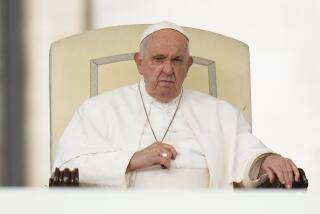Serbian Orthodox Church Issues Formal Call for Milosevic to Quit
- Share via
BELGRADE, Yugoslavia — Warning that President Slobodan Milosevic is leading Yugoslavia into “certain disaster,” Serbian Orthodox Church leaders formally called on him Wednesday to resign.
The church joined the growing opposition movement trying to oust Milosevic after a synod of bishops decided that he and Serbian President Milan Milutinovic are “turning their own people into hostages.”
They “should, as soon as possible, allow other people to take over the helm of state and lead the people out of the dead end into which they have been brought,” the bishops’ statement said.
For years, Milosevic has exploited infighting among his opponents to strengthen his hold on power. While the pro-democracy movement is still divided, leaders are trying to form a more united front.
Several parties and the Orthodox church plan to join in a mass rally next Thursday in Belgrade, the first large-scale protest in the capital of Yugoslavia after weeks of demonstrations in other Serbian cities.
Although Serbian Orthodox clerics have spoken out against Milosevic in recent weeks, and even insisted that he be sent to the war crimes tribunal in The Hague, Wednesday’s statement was the first by a synod of bishops, which decides church doctrine that applies to millions of believers.
Milosevic and his top military commanders have vowed to use force to stop any move to unseat him. On Tuesday, Milosevic’s ruling Socialist Party of Serbia accused NATO of trying “to enslave Yugoslavia” with “puppet political parties and corrupt leaders.”
The more extremist Serbian Radical Party called leaders of next Thursday’s planned protest “political yes-men and serfs” of Washington.
Milosevic, Milutinovic and three other senior officials and commanders were indicted by the International Criminal Tribunal for the Former Yugoslavia on charges of mass murder and expulsion of ethnic Albanians from Kosovo, a province of Serbia, Yugoslavia’s main republic.
The bishops also accused the NATO-led peacekeeping force, known as KFOR, and the United Nations civilian administration in Kosovo of failing to stop the killing and expulsion of Kosovo’s Serbian minority by ethnic Albanians.
“We demand from KFOR and representatives of the U.N. in Kosovo that they finally stop the terror and total ethnic cleansing of Orthodox Serbs and ethnic minorities, executed in their presence and under their supervision,” the bishops said.
The Orthodox clerics, and other opposition leaders, blame Milosevic for the disastrous war for control of Kosovo, which has about 1,000 Orthodox churches and monasteries, many dating back to the Middle Ages.
Last spring, Milosevic rejected a North Atlantic Treaty Organization ultimatum that would have put about 28,000 NATO-led peacekeepers in Kosovo and given them free access to the rest of Yugoslavia. He said that would violate Yugoslav sovereignty.
Milosevic’s rejection brought on NATO bombing March 24, and within hours, Serbian gunmen began killing ethnic Albanians, burning their homes and expelling hundreds of thousands to neighboring Albania and Macedonia.
Milosevic was forced to surrender to NATO after 11 weeks of airstrikes and to agree to a NATO-led force that will eventually reach 50,000 troops, almost double the original force he rejected.
Two months after driving the Serbian security forces from Kosovo, the NATO-led peacekeepers have failed to stop ethnic Albanians from killing Serbs and burning their homes.
About 170,000 of an estimated population of 200,000 Kosovo Serbs have fled the province, according to the Office of the U.N. High Commissioner for Refugees.
The top U.S. officer in the peacekeeping force said Wednesday that intimidation of Serbs by ethnic Albanians appeared organized and systematic in the southeastern sector controlled by American soldiers. But Brig. Gen. John Craddock stopped short of blaming the separatist Kosovo Liberation Army for the violence.
At a news conference in Pristina, Kosovo’s provincial capital, he blamed “rogue elements” whose links with the KLA were unclear as well as “disaffected former KLA members.”
Serbian opposition leaders cite the rapidly shrinking Serbian minority in Kosovo as one of the main reasons Milosevic must be removed soon. As an indicted war crimes suspect, he can’t put pressure on foreign governments to protect Serbs.
But the opposition is split on such crucial issues as whether members of Milosevic’s ruling party and its allies should be included in a transitional government that would take over if he steps down, and govern until elections can be held.
Vuk Draskovic, the popular leader of the Serbian Renewal Movement, argues that an alliance with members of the ruling parties who are turning against Milosevic is the safest option.
His party “could not lend support to self-appointed governments formed in the street because that would be a mere deepening of the agony and division among our people,” Draskovic said after a meeting including opposition leaders and the head of the Orthodox church, Patriarch Pavle, in Belgrade on Tuesday.
There is also a debate over whether politicians should take part in a transitional government at all. Some opposition leaders are pushing for a government of experts in economics, reconstruction and other areas crucial to repairing what is left of Yugoslavia after years of war.
More to Read
Sign up for Essential California
The most important California stories and recommendations in your inbox every morning.
You may occasionally receive promotional content from the Los Angeles Times.










